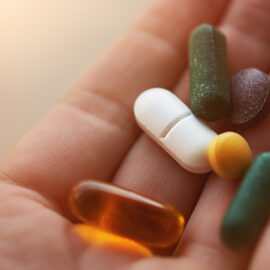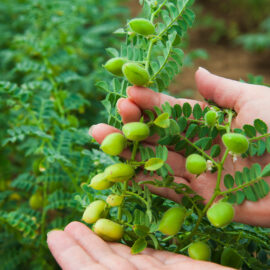The Olympic games are a chance to catch awe-inspiring, world class athletes in action. Both Olympic-level athletes and avid exercisers are driven to maximize achievement, and many top athletes follow a plant-based diet to improve recovery and performance. Plant-based diets are rich in whole grains, beans, legumes, nuts, seeds, fruits and vegetables, and they minimize but don’t always exclude animal products. This way of eating is popular due to benefits for health and the environment, and a well-planned, plant-based eating routine may offer a competitive advantage.
Benefits for Athletic Performance
While a plant-based diet is best known for its whole-body health benefits, this eating pattern may also provide direct improvements toward optimizing athletic performance including:
- Building lean body mass and reducing excess body fat
A plant-based diet leads to reductions in body fat due to increased energy expenditure and reduced calorie intake.1 The typical lower fat and higher fiber content of a plant-based diet can significantly reduce body fat. One of the proposed mechanisms of the advantages of a lower fat plant-based diet is increased energy expenditure after a meal, which has been suggested to be due to changes in mitochondrial activity. The number and activity of mitochondrial cells in the body is constantly changing, and diet influences these changes.2 In an examination of subjects eating a 50% fat diet, the biogenesis of mitochondrial cells was significantly reduced in just three days.3 High-fat diets are thought to disrupt cellular metabolism which reduces energy expenditure, while a plant-based diet with lower levels of fat has the opposite effect, increasing post-meal energy expenditure. The lower fat plant-based diet also typically has higher amounts of carbohydrate which requires more metabolic work to convert to body fat, favoring a reduction in body fat storage.2 Furthermore, research has also suggested that a high-protein, exclusively plant-based diet is no different from a protein matched mixed-diet in supporting muscle strength and mass accrual. Increased VO2 max
VO2 max is a measure of the maximum rate of oxygen consumption during increasing exercise intensity. An athlete with a higher VO2 max relative to body weight will outperform an athlete with a lower VO2 max due to the advantages this provides for endurance.2 When comparing subjects with type 2 diabetes following a conventional diet versus a plant-based diet with a calorie restriction (- 500 kcal/day), those following a plant-based diet, consisting mostly of whole plant foods with one serving of low-fat dairy daily, had a 12% increase in VO2 max. No advantages were observed in VO2 max for those following the conventional diet typically recommended for people with diabetes, which included a slightly lower carbohydrate content and slightly higher protein and fat content than the plant-based diet.4Improvement in glycogen storage
During moderate and high-intensity exercise, carbohydrate is the primary source of energy. Healthful carbohydrates such as grains, legumes and root vegetables are plentiful in plant-based diets. Carbohydrate intake is important to fuel activity before an event, and it also helps maximize liver and muscle glycogen stores to fuel long-term activity.2,5Increased oxygenation of tissues
A plant-based diet is typically low in saturated fat. This reduces plasma lipid concentrations which may lead to improvements in blood viscosity, or less resistance to blood flow, and improvements in arterial flexibility, endothelial function and oxygenation of tissues. The bloodstream carries oxygen and nutrients to tissues and removes metabolic waste products, and athletic activity depends on these processes.2Less oxidative stress and inflammation
Although exercise produces healthful changes in the body, it also produces free radicals as a normal function of the cell mitochondria and other cell responses from tissue damage. When the production of free radicals exceeds the body’s ability to neutralize them, this results in oxidative stress which can lead to muscle fatigue and impairments in athletic performance and recovery. A plant-based diet rich in antioxidant-rich fruits, vegetables and grains improves antioxidant activity as well as antioxidant enzyme production in the body.2 Intense exercise causes an inflammatory response in the body that may contribute to sore muscles, pain, reduced muscular performance and impaired recovery. A plant-based diet with low levels of saturated fat and more antioxidant-rich fruits, vegetables and grains is helpful in fighting inflammation.2,6
Protein from Plants
Both resistance and endurance training have important effects on skeletal muscles that impact the requirement of dietary protein for muscle protein synthesis, remodeling and repair. Exercise itself increases muscle protein synthesis, and post-exercise nutrition is an important part of optimizing skeletal muscle adaption.7 Plant-based whole foods can supply not only adequate protein but additional nutrients including vitamins, minerals and carbohydrates. A plant-forward diet contributes to post-exercise muscle protein synthesis as well as offering benefits for health, body composition and athletic performance.7,8 Short-term studies show that a well-planned, plant-based diet with adequate protein also supports bone density9 and strength.10
A variety of whole foods from a plant-based diet can adequately raise blood leucine concentrations, which is a branched chain amino acid (BCAA) and an indicator of muscle protein synthesis. The use of protein supplements is helpful to increase blood leucine concentration and vegetarian protein supplements that include a variety of plant-based protein sources can supply adequate leucine to promote muscle protein synthesis.5,11 Although leucine is an essential amino acid and blood levels of leucine are an indicator of muscle synthesis, a balanced intake of all essential amino acids is important to promote muscle synthesis.12
Athletes following a plant-based diet may have questions about processing of vegetarian sources of protein and whether this improves the availability of protein from these sources. Processes including fermenting and germinating of vegetarian foods improves nutrient profiles, which can be beneficial for the plant-based athlete in fighting oxidation. The evidence is unclear regarding the benefits of germination methods on improving availability of vegetarian protein sources for the body, with mixed results likely due to differences in germination testing conditions. Fermentation of plant proteins increases the digestibility of the protein possibly due to partial breakdown of complex protein into more soluble forms and partial predigestion by bacteria.13
Cardiovascular Health and Endurance Athletes
Endurance athletes may benefit from plant-based diets to help prevent atherosclerosis,2 which is more common in endurance athletes than sedentary adults. Although the mechanism is unclear, longstanding endurance activity is linked to a modest increase in calcified coronary plaques.14 In a small study comparing sedentary males with male runners who have completed at least one marathon yearly for 25 consecutive years, the runners had accelerated coronary plaque volume.15 Plant-based diets improve plasma lipid concentrations, blood glucose control, blood pressure, body weight and antioxidant activity, which not only helps prevent atherosclerosis but can also improve performance and recovery for endurance athletes.2
In a study comparing over 44,0000 vegetarian and nonvegetarian men and women, vegetarians were found to be 32% less likely to develop ischemic heart disease (IHD)16, which is narrowed heart arteries that can lead to a heart attack.17 The vegetarians had lower systolic blood pressure,16 which is an indication of how much pressure is exerted against artery walls as the heart beats.17 They also had a better lipid profile possibly due to lower BMI and consuming more healthy unsaturated fats and less saturated fats. The lower BMI rates among the vegetarians studied may be a factor in the lower systolic blood pressure, a 3.3 mm Hg reduction was found in the vegetarians, which could translate to an estimated 10% reduction in risk for IHD.16
Considerations for Athletes
Protein consumed immediately after exercise and evenly throughout the recovery period is beneficial to stimulate muscle protein synthesis and facilitate muscle repair.7,8 Ideally, it’s important to include protein within the first hour and at regular intervals over the 5 to 72-hour period following exercise to optimize skeletal muscle response. Since regular exercisers and athletes don’t typically have long breaks between exercise events, consuming protein-rich foods in meals and snacks is especially important. Exercise specific diet advice requires careful planning by a nutrition professional.8
U.S. and international sports nutrition experts recommended a minimum of 1.2 to 2.0 grams of protein per kg body weight per day for vegetarian athletes.5,12 Protein supplements are a convenient, reliable way to help meet these increased requirements. Liquid protein supplements are helpful since liquids are both convenient and not filling, making them easy to add to the diet.5,8 When protein is taken in combination with whole foods containing carbohydrate, this can help facilitate muscle glycogen resynthesis.8
Scott Sehnert, MS, RD, CSCS, CSSD, a sports dietitian, Director of Sports Performance for the Dallas Cowboys and member of Orgain’s Nutrition Advisory Board states, “There is a growing body of evidence showing that plant-based nutrition, when planned properly, can support muscle growth equally to nutrition from animal sources. Orgain Sport Protein is a way to support plant-based nutrition as its blend provides sufficient leucine to stimulate protein synthesis and muscle growth.”
![]()
1 Najjar RS, Feresin RG. Plant-based diets in the reduction of body fat: physiological effects and biochemical insights. Nutrients 2019; (11)2712. doi:10.3390/nu11112712
2 Barnard ND, Goldman DM, Loomis JF, Kahleova H, Levin SM, et al. Plant-based diets for cardiovascular safety and performance in endurance sports. Nutrients 2019; (11)130. doi:10.3390/nu11010130
3 Sparks LM, Xie H, Koza RA, Mynatt R, Hulver MW, et al. A high-fat diet coordinately downregulates genes required for mitochondrial oxidative phosphorylation in skeletal muscle. Diabetes 2005; 54(7):1926-33. doi: 10.2337/diabetes.54.7.1926.
4 Veleba J, Matoulek M, Hill M, Pelikanova T, Kahleova H. A vegetarian vs. conventional hypocaloric diet: The effect on physical fitness in response to aerobic exercise in patients with type 2 diabetes. A parallel randomized study. Nutrients 2016; (8) 671. doi:10.3390/nu8110671
5 Phillips SM, Van Loon LJC. Dietary protein for athletes: From requirements to optimum adaptation. Journal of Sports Sciences 2011; (29)29–38. doi: 10.1080/02640414.2011.619204.
6 Wirnitzer K, Boldt P, Lechleitner C, Wirnitzer G, Leitzmann C, et al. Health status of female and male vegetarian and vegan endurance runners compared to omnivores – results from the NURMI study (step 2). Nutrients 2018; (11)29. doi:10.3390/nu11010029
7 Burd NA, Beals JW, Martinez IG, Salvador AF, Skinner SK. Food-first approach to enhance the regulation of post-exercise skeletal muscle protein synthesis and remodeling. Sports Medicine 2019; (49)59–68. doi: 10.1007/s40279-018-1009-y.
8 van Vliet S, Beals JW, Martinez IJ, Skinner SK, Burd NA. Achieving optimal post-exercise muscle protein remodeling in physically active adults through whole food consumption. Nutrients 2018; (10)224. doi:10.3390/nu10020224
9 Knurick, JR, Johnston CS, Wherry SJ, Aguayo I. Comparison of correlates of bone mineral density in individuals adhering to lacto-ovo, vegan, or omnivore diets: A cross-sectional investigation. Nutrients 2015; (7)3416–3426. doi: 10.3390/nu7053416
10 Lynch HM, Wharton CM, Johnston CS. Cardiorespiratory fitness and peak torque differences between vegetarian and omnivore endurance athletes: a cross-sectional study. Nutrients 2016; (8)726. doi: 10.3390/nu8110726
11 Berragaza I, Michard V, Gueugneau M, Walrand S. The role of anabolic properties of plant-versus-animal-based protein sources in supporting muscle mass maintenance: a critical review. Nutrients 2019; (11)1825. doi:10.3390/nu11081825
12 Jager R, Kersick CM, Campbell BI, Cribb PJ, Wells SD. International society of sports nutrition stand: protein and exercise. Journal of the International Society of Sports Nutrition 2017; (14)20. DOI 10.1186/s12970-017-0177-8
13 Nkhata SG, Ayua E, Kamau EH, Shingiro JB. Fermentation and germination improve nutritional value of cereals and legumes through activation of endogenous enzymes. Food Science & Nutrition 2018; (6)2446-2458. DOI: 10.1002/fsn3.846
14 Merghani A, Maestrini V, Rosmini S, Cox AT, Dhutia H, et al. Prevalence of subclinical coronary artery disease in masters endurance athletes with a low atherosclerotic risk profile. Circulation 2017; (136) 126-137. DOI: 10.1161/CIRCULATIONAHA.116.026964
15 Schwartz RS, Merkel Kraus S, Schwartz JG, Wickstrom KK, Peichel G, et al. Increased coronary artery plaque volume among male marathon runners. Missouri Medicine 2014; (111:2)89. https://europepmc.org/article/med/30323509
16 Crowe FL, Appleby PN, Travis RC, Key TJ. Risk of hospitalization or death from ischemic heart disease among British vegetarians and nonvegetarians: results from EPIC-Oxford cohort study. The American Journal of Clinical Nutrition 2013. 97(3):597-603. doi: 10.3945/ajcn.112.044073.
17 The American Heart Association, Silent Ischemia and Ischemic Heart Disease. Available at: https://www.heart.org/en/health-topics/heart-attack/about-heart-attacks/silent-ischemia-and-ischemic-heart-disease, accessed 6/2/2021. Understanding Blood Pressure Readings. Available at: https://www.heart.org/en/health-topics/high-blood-pressure/understanding-blood-pressure-readings, accessed 6/2/2021.



